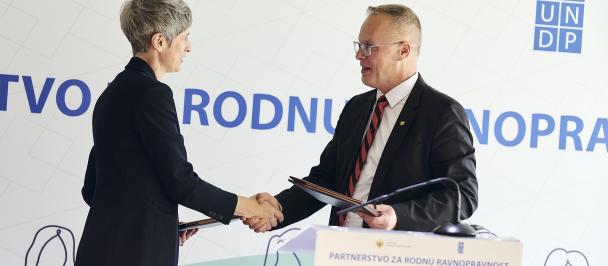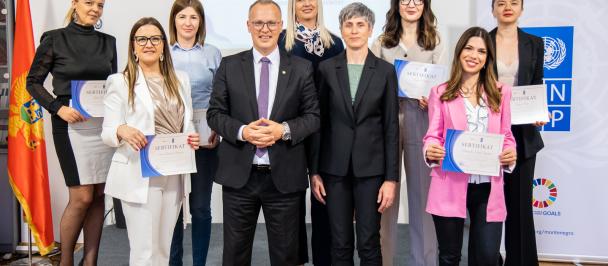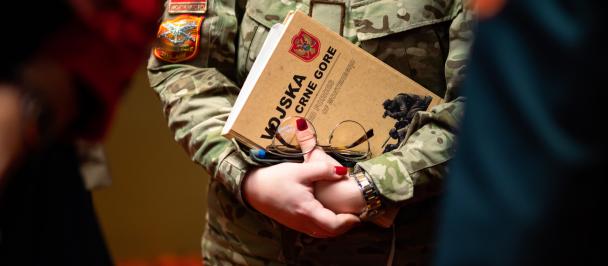Women are increasingly exposed to violence in the digital space, a worrying statistic that has not changed for years
December 15, 2022

"Let's raise our voice together against violence – let's not turn our heads away, let's not tolerate violence, let's support each other and react", Daniela Gasparikova, UNDP Resident Representative for Montenegro, says in an interview with the Dnevno web portal.
She notes that the worrying statistics have not changed for years, indicating that many women globally, including in Montenegro, experience violence. UNDP's estimates show that globally one in three women has experienced some form of violence. According to Monstat data, one in five women In Montenegro has experienced partner violence during her lifetime.
"Additionally, data from NGOs, which are key providers of specialised services to women who have experienced violence, show that an average of 200 women are placed in shelters for victims of violence annually. If we add that four cases of femicide occurred in less than a year, it is clear that physical violence against women takes the most brutal form and that it is a critical moment for the system and the entire society to react – including men, but also boys who will show zero tolerance for gender-based violence and violence against women in their behaviour," Gasparikova adds.
Responsibility of the system
UNDP Resident Representative for Montenegro points out that women are not only exposed to physical violence, but increasingly to violence in the digital space – hate speech with a misogynist and sexist tone, psychological violence, sexual harassment...
"Violence against women has serious consequences for the entire society, and each new case raises serious questions about the responsibility of the system and its readiness to, above all, prevent violence, but also to adequately punish the perpetrators when it occurs. The comprehensive legislative framework regulating violence against women should be harmonised with international standards and fully implemented. A formal system of multidisciplinary protection does exist, but in practice it does not function adequately, occasionally supporting traditional stereotypes, which leads to the exposure of women with experience of violence to traumatisation, loss of trust in institutions and abandonment of court cases," Gasparikova says.
According to her, as many as 74 per cent of victims of sexual violence have never told anyone, not even a close person, about it. Gasparikova adds that they often do not recognise violence, feel guilt and shame because of the experience of violence, think that they will not be understood and supported by close people, and finally – that they do not trust the institutional system.
"That is why they mostly find salvation from violence in civil society organisations, which themselves struggle with the lack of capacities and resources to work with women who have experienced violence. That is why it is important for the state to recognise the important role of NGOs and find a sustainable and long-term model for their funding, which is one of the key recommendations of GREVIO (Committee on the Assessment of Legislative and Other Measures Applying the Provisions of the Council of Europe Convention on the Preventing and Combating Violence against Women and Domestic violence – the Istanbul Convention), Gasparikova points out.
Cooperation and coordination of all – the government, the police, the judiciary, civil society organisations, but also individuals – is needed, she points out, in order to build a system that provides a quick and efficient response to violence.
Strengthening the capacities of institutions
Gasparikova emphasises that women who suffer from violence and potential victims should be encouraged to report violence and send them a message that, when violence happens, they will have support and adequate protection.
"This is only possible if we strengthen the capacities of institutions, improve the Protocol on Treatment, Prevention and Protection against Violence and fully implement it, and if we actively and continuously raise the awareness of citizens about this problem", Gasparikova believes.
She adds that Montenegrin society is shaped by deeply-rooted patriarchal attitudes and patterns that are potentially the basis for gender-based violence, stating that it took many years to raise awareness of the issue of violence against women in Montenegrin society.
"So today we have more and more citizens who are ready to react and be part of joint efforts to eliminate violence," Gasparikova says.
The global UN campaign "16 days of Activism against Gender-Based Violence", which has recently ended, and which has been organised for years, serves as an encouragement, as she notes, to everyone to get involved in efforts that lead to the elimination of violence – from women who have experienced violence, feminist and peace movements, women's organisations, institutions, individuals, including women and men as important allies.
"The campaign is both an opportunity to inspire individuals and a call to action. However, zero tolerance for violence is our obligation not only during the 16 days of the campaign, but every day," Gasparikova says.
She points out that gender-based violence and violence against women represent a violation of human rights.
"There is no place for violence in a free society in which the Constitution guarantees the right to life, dignity and respect for the individual. Therefore, let's raise our voice against violence – let's not turn our heads away, let's not tolerate violence, support each other and react," Gasparikova concluded.

 Locations
Locations

